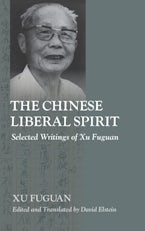
The Chinese Liberal Spirit
Selected Writings of Xu Fuguan
Series: SUNY series, Translating China
351 Pages
- Hardcover
- ISBN: 9781438487175
- Published By: State University of New York Press
- Published: February 2022
$95.00

Series: SUNY series, Translating China
351 Pages
$95.00